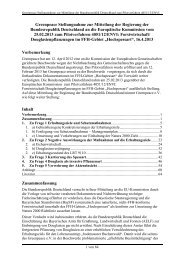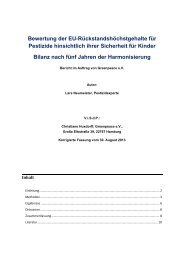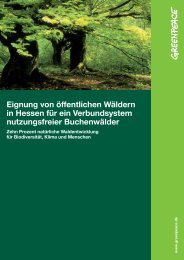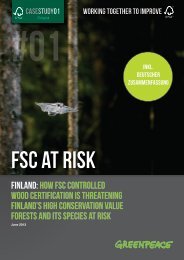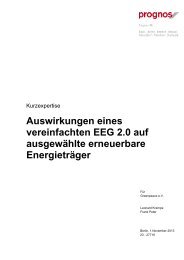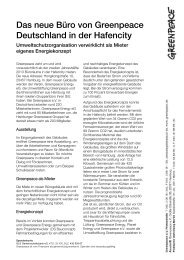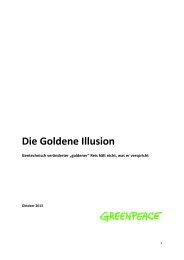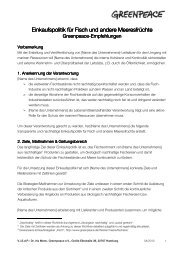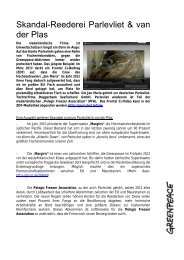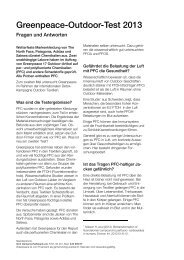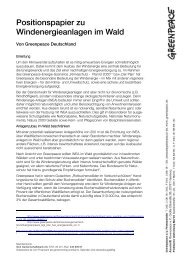Untitled - Greenpeace
Untitled - Greenpeace
Untitled - Greenpeace
You also want an ePaper? Increase the reach of your titles
YUMPU automatically turns print PDFs into web optimized ePapers that Google loves.
CARVING UP THE CONGO<br />
27<br />
©<strong>Greenpeace</strong>/Davison<br />
title holder’s respect of boundaries in the<br />
DRC’. In a letter to <strong>Greenpeace</strong> in November<br />
2006, the Independent Observer admitted:<br />
‘It is a weakness in the process that we are<br />
concerned about, but we do not have a<br />
feasible alternative to offer.’ 133<br />
This admission effectively rules out one of the<br />
criteria of the legal review, and potentially<br />
legitimises gross tax avoidance in cases where<br />
loggers have been logging larger areas of<br />
forest than that for which they have paid the<br />
relevant taxes.<br />
s Validity of title: According to the<br />
Independent Observer, the correct<br />
application process will have to have been<br />
observed (ie obtaining a Prospecting<br />
Authorisation and then a Letter of Intent<br />
before receiving a Guarantee of Supply) and<br />
the title holder must have a functioning<br />
processing plant. 134<br />
Thus the review seems unlikely to be effective<br />
even on its own narrow terms. There is also a<br />
question mark over what will happen if and<br />
when titles in violation of the moratorium are<br />
actually cancelled: title holders are likely to use<br />
their right of appeal to play for time and<br />
continue logging. 135 Logging and the<br />
establishment of logging infrastructure are<br />
already under way in many of the titles<br />
allocated in breach of the moratorium,<br />
amounting to de facto land use decisions in<br />
favour of industrial logging which will be<br />
extremely challenging to reverse.<br />
In October 2006, a coalition of NGOs including<br />
<strong>Greenpeace</strong> contacted the World Bank to raise<br />
further concerns about the shortcomings and<br />
risks of the legal review. 136 These included:<br />
s failure to undertake participatory land use<br />
planning (zoning) prior to the completion of<br />
the legal review process<br />
s the absence of a guarantee that social<br />
conflicts within existing logging title areas<br />
will be fully assessed and every effort made<br />
to resolve them prior to the completion of<br />
the legal review process (see social chapter)<br />
<strong>Greenpeace</strong> fears that the legal review is not<br />
going to seize the opportunity to contribute to<br />
poverty alleviation and environmental<br />
protection by reining in the worst excesses of<br />
the logging companies.<br />
THE WORLD BANK LEAVES THE<br />
IMPLEMENTATION OF MEASURES TO<br />
MITIGATE SOCIAL AND ENVIRONMENTAL<br />
IMPACTS LARGELY TO THE INDUSTRY ITSELF<br />
According to the 2005 Presidential Decree,<br />
logging companies who keep their forest<br />
holdings have four years from the conclusion<br />
of the legal review to prepare forest<br />
management plans in which major outstanding<br />
social and environmental issues should, in<br />
theory, be resolved (during which time they<br />
can keep logging with virtual impunity). 138<br />
Deferring resolution of outstanding social and<br />
environmental conflicts to the development of<br />
the forest management plan leaves logging<br />
companies free to resolve these issues<br />
themselves in whatever way they see fit<br />
rather than obliging companies to deal with<br />
these issues properly and in advance of the<br />
conversion process.<br />
In <strong>Greenpeace</strong>’s view, this arrangement is<br />
overly favourable to the companies and<br />
unlikely to foster environmental and social<br />
responsibility, particularly in view of some<br />
companies’ dismissive attitude to forest<br />
management plans (see below). As the<br />
Independent Observer admits, it ‘creates a<br />
presumption that because the titles have<br />
already been awarded for industrial forestry<br />
this land is indeed suitable for this purpose.<br />
Also the conversion process will not benefit<br />
from any social and environmental safeguards<br />
attached to the zoning process.’ 139 The legal<br />
review process as it stands will in fact amount<br />
to de facto land use planning in the absence of<br />
key evidence as to the suitability of the land<br />
for industrial forestry and the threats to social<br />
and environmental interests. This is not an<br />
acceptable position. Instead, the resolution of<br />
such issues and any conflicts arising should<br />
be a clear criterion of progress through the<br />
legal review.<br />
Similar concerns have been expressed by the<br />
Independent Observer. 137



